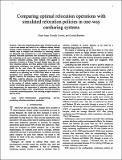Comparing Optimal Relocation Operations With Simulated Relocation Policies in One-Way Carsharing Systems
Author(s)
Jorge, Diana; Correia, Goncalo H. A.; Barnhart, Cynthia
Download2017_09_29_13_54_22.pdf (1.140Mb)
OPEN_ACCESS_POLICY
Open Access Policy
Creative Commons Attribution-Noncommercial-Share Alike
Terms of use
Metadata
Show full item recordAbstract
One-way carsharing systems allow travelers to pick up a car at one station and return it to a different station, thereby causing vehicle imbalances across the stations. In this paper, a way to mitigate that imbalance is discussed, which is relocating vehicles between stations. For this purpose, two methods are presented, i.e., a new mathematical model to optimize the relocation operations that maximize the profitability of a carsharing service and a simulation model to study different real-time relocation policies. Both methods were applied to networks of stations in Lisbon, Portugal. Results show that relocating vehicles, using any of the methods developed, can produce significant increases in profit. For instance, in the case where the carsharing system provides maximum coverage of the city area, the imbalances in the network resulted in an operating loss of C1160/day when no relocation operations were performed. When relocation policies were applied, however, the simulation results indicate that profits of C854/day could be achieved, even with increased costs due to relocations. Using the mathematical model, the results are even better, with a reached profit of C3865.7/day. This improvement was achieved through reductions in the number of vehicles needed to satisfy the demand and the number of parking spaces needed at stations. These results demonstrate the importance of relocation operations for profitably providing a network of stations in one-way carsharing systems that covers the entire city, thus reaching a higher number of users.
Date issued
2014-03Department
Massachusetts Institute of Technology. Department of Civil and Environmental EngineeringJournal
IEEE Transactions on Intelligent Transportation Systems
Publisher
Institute of Electrical and Electronics Engineers (IEEE)
Citation
Jorge, Diana et al. “Comparing Optimal Relocation Operations With Simulated Relocation Policies in One-Way Carsharing Systems.” IEEE Transactions on Intelligent Transportation Systems 15, 4 (August 2014): 1667–1675 © 2014 Institute of Electrical and Electronics Engineers (IEEE)
Version: Author's final manuscript
ISSN
1524-9050
1558-0016